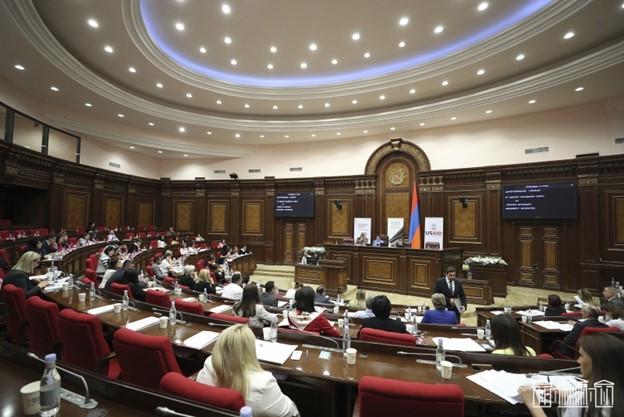
The Armenian government has initiated a new law “On Volunteer Work”. It will regulate the concept and procedure of engaging volunteers in state and community institutions and non-profit organisations. In May 2023, the relevant standing committee of the Armenian parliament organised parliamentary hearings on the draft to collect suggestions from the stakeholders. Transparency International Anticorruption Center (TIAC) participated and provided recommendations on the draft at the hearings. One issue that remains a problematic is the provision concerning the necessity of signing a contract with a volunteer regardless of their service term.
Existing gaps in the legislation
At present, the Armenian legislation does not provide a clear definition of - or incentives for - volunteering. There is no special law covering volunteer activities. The Law on Public Organisations defines the right and the procedure for involving volunteers in the work of a public organisation. According to the law, if volunteer work hours exceed 20 hours per week, the organisation should sign a voluntary work contract with volunteers. However, it is forbidden to involve volunteers in the entrepreneurial activities of the organisation. According to the Law on Charity, volunteers are individuals who perform gratuitous work for charity beneficiaries. The Labour Code mentions that voluntary work and assistance cannot be considered illegal.
As noted in the recent CSO Meter Armenia report, these fragmented regulations on volunteers do not cover some of the aspects related to the taxation of volunteer cost compensation, the involvement of volunteers in foundations, issues of liability and the involvement of international volunteers. The report has recommended to adopt regulations to address the existing gaps in the legislation on volunteering in consultation with CSOs and, particularly, volunteer-based organisations.
History of the draft law on volunteering
Since 2017, the Ministry of Labour and Social Affairs has developed several drafts of a law on volunteering to regulate the concept of volunteerism, main objectives of volunteer work, volunteer rights and responsibilities, compensation for costs and other issues. At first, the draft received mixed reactions from CSOs. Many of them found that excessive regulations might have a restrictive impact. On the other hand, CSOs dealing with a large number of volunteers and engaged in volunteer exchange programmes mention the necessity to address existing legislative gaps.
The revised version of the draft was presented for public discussion in 2020, and further – in December 2022. By then, the version of the draft incorporated most of the suggestions by CSOs and many excessive regulations were removed. However, it still contained limitations on the involvement of volunteers in the entrepreneurial activities, and some other restrictive provisions, such as a requirement to sign a contract with volunteers and register them with the tax body. Based on the CSOs’ suggestions, these limitations were removed in the final draft that was approved on 6 April 2023 by the government along with a package of relevant draft amendments, and sent to the parliament for discussion and adoption.
Parliamentary hearings
On May 10, 2023 the parliament’s Standing Committee on Labour and Social Affairs initiated parliamentary hearings on the draft law “On Voluntary Work” and related amendments. The Deputy Minister of Labour and Social Affairs presented the draft law, noting that it will provide an opportunity to encourage and support volunteering in Armenia. Participants welcomed the draft law and positively assessed the legislative package. Various proposals were presented related to setting the volunteer work as professional length of service, proposing distinct mechanisms of encouraging the volunteer, avoiding corruption risks, and setting minimum threshold for the volunteer’s rest.
TIAC lawyer Anush Hakobyan presented TIAC's considerations regarding the draft law. She positively assessed recent changes in the draft allowing involvement of volunteers in economic activities and removing the requirement of registration with state bodies. She proposed several recommendations related to defining the host organisation’s obligation to engage volunteers in educational activities, provisions related to volunteers’ rest, and agreement on volunteer work.
Problematic provisions and improvements in the current draft law
The provision of a mandatory contract between the volunteer and organisation is viewed by TIAC as the most problematic in the draft law. It was also criticised by many CSOs present at the hearings as a possible limitation to engagement of volunteers. In particular, according to the draft, only a person that has signed volunteer work agreement with the organisation can be considered a volunteer. Moreover, the provisions of the draft set that in case of voluntary work that is performed without an agreement, this work is considered illegal, and the organisation can be subject to fines. These provisions have raised concerns that even short-term volunteers need to sign a contract.
They might be additional burdens for CSOs, especially in case of engagement of large number of volunteers for a short-term event or activity. The obligation of the organisation to engage volunteers in its educational activities is also unclear, as not all organisations can provide such activities. On the other hand, it is not always possible to engage all volunteers in such activities, which should be a right of the volunteer, not an obligation.
On the positive side, the draft addresses most of the recommendations highlighted in the CSO Meter report: waiving taxes for volunteer cost compensation, allowing the involvement of volunteers in any non-profit organisations, regulating issues of liability and the involvement of international volunteers.
As a follow up to the parliamentary hearings, the organisers noted that they would review the proposals in detail and incorporate in the draft before presenting for the parliament voting.
Photo source: www.parliament.am website
